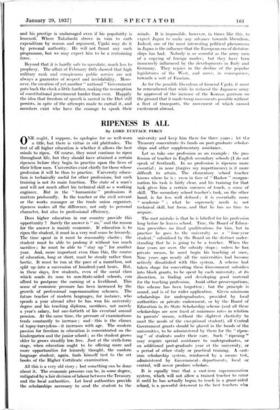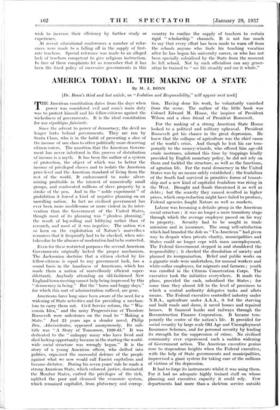RIPENESS IS ALL
By LORD EUSTACE PERCY 4'yE ought, I suppose, to apologise for so well-worn .a title, but there is virtue in old platitudes. The test of all higher education is whether it allows the best minds to ripen. Of course, they must continue to ripen throughout life, but they should have attained a certain ripeness before they begin to practise upon the lives of their fellow men. Universities exist chiefly for those whose profession it will be thus to practise. University educa- tion is technically useful for other professions, but such training is not its main function. The state_ of a man's soul will not much affect his technical skill as a working engineer. But in the " humanistic " professions it matters profoundly. In the teacher or the civil servant or the works manager or the trade union organiser, ripeness makes all the difference, not only to personal character, but also to professional efficiency.
Does higher education in our country provide this opportunity ? Surely the answer is " no," and the reason for the answer is mainly economic. If education is to ripen the student, it must in a very real sense be leisurely. The time spent in it must be reasonably elastic ; the student must be able to prolong it without too much sacrifice ; he must be able to " stay up " for another year. And, more important even than this, the course of education, long or short, must be steady rather than hectic. It must be run at the pace of a marathon, not split up: into a succession of hundred-yard heats. But, in these days, few students, even of the social class which sends its sons to non-State-aided schools, can afford: to postpone the earning of a livelihood. This sense of economic pressure has been increased by the growth of professional superannuation schemes. The future teacher of modern languages, for instance, who spends a year abroad after he has won his university degree and his teaching diploma, sacrifices, not merely a year's salary, but one-fortieth of his eventual annual pension. At the same time, the pressure of examinations tends constantly to increase ; and—this is the climax of topsy-turvydom—it increases with age. The modern passion for freedom in education is concentrated on the kindergarten and the junior school ; as the student grows older he grows steadily less free. Just at the sixth-form stage, when education ought to be offering more and more opportunities for leisurely thought, the modern language student, again, finds himself tied to the set books of the Higher Certificate examination.
All this is a very old story ; but something can be done about it. The economic pressure can be, in some degree, mitigated by a fair division of labour between the Treasury and the _local authorities. _Let local authorities provide the scholarships necessary . to send - the student -to the university and keep him there for three years ; let tl:c Treasury concentrate its funds on post-graduate scholar- ships and other supplementary assistance.
• Let us take one profession as an example : the pro- fession of teacher in English secondary schools (I do not speak of Scotland). In no profession is ripeness more essential ; in none (forgive my impertinence) is it more difficult to attain. The elementary school teacher knows where he is ; even in face of " Hadow " reorgan, isation his task is fairly clear, and his training for that task gives him a certain sureness of touch, a sense of skill. The secondary school teacher's task, on the other hand, is far less well defined ; it is essentially more " academic " ; what- he supremely needs is, not technical skill, but focus, and that he has no time to acquire.
. The root mistake is that he is labelled for his profession long before he leaves school. True, the Board of Educa- tion prescribes no fixed qualifications for him, but in practice he goes to the university as a " four-year student," subsidised by the Board on the distinct under- standing that he is going to be a teacher. When the four years are over, the subsidy stops ; unless he has private means, he must begin his teaching at, once. Nine years ago nearly all the universities had become actively dissatisfied with this system. A scheme had taken shape for converting these Government subsidies into block grants, to be spent by each university, at its discretion, in finding and developing good .material • for the teaching profession. Amid other preoccupations, this scheme has been forgotten ; but the principle is sound, and is of far wider application. Given minimum scholarships for undergraduates, provided by local authorities or private endowment, or by the Board of Education in its State Scholarship scheme (and all these scholarships are now fixed at minimum rates in relation to parents' means, without the slightest elasticity to meet the needs of the exceptional student), all Central Government_ grants should be placed in the hands of the universities, to be administered by them for the " ripen- - ing " of students under their care. • Such " ripening " • may require special assistance to undergraduates, or an additional post-graduate year at the university, or a period of other study or practical. training. A east- iron scholarship system, reinforced by a means test, administered by Government - departments, local or central, will never produce scholars.
It is equally true that a east-iron superannuation system, which will not allow a trained teacher to enter it until he has actually begun to teach in a grant-aided school, is a powerful deterrent to the best teachers who wish to increase their efficiency by further study or experience.
At recent educational conferences a number of refer- ences were made to a falling off in the supply of first- rate teachers. Special reference was made to an alleged lack of teachers competent to give religious instruction. In face of these complaints let us remember that it has been the fixed policy of successive governments in this country to confine the supply of teachers to certain rigid " scholarship " channels. It is not too . much to say Ceat every effort has been made to warn off from the schools anyone who finds his teaching vocation after he has begun his university career, or who has not been specially subsidised by the State from the moment he left, school. Not by such officialism can any gener- ation.he trained to " see life steadily and see it whole."























































 Previous page
Previous page